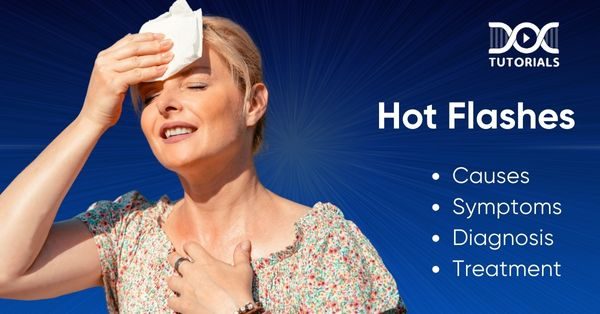Hot Flashes: Causes, Symptoms, Diagnosis, and Treatment

Around 75% of women experience hot flashes during their menopause, a phenomenon which severely disrupts their sleep, daily activities, and well-being, thereby impacting both physical and emotional stability. To manage the impact of hot flashes, women need to understand their causes, symptoms, and treatment options.
This guide explains the science behind hot flashes, their triggers, and the best ways to overcome this challenging natural phase of life.
What are Hot Flashes?
Hot flashes are a common symptom of menopause that feel like a sudden heat, sweating, and redness of the face, neck, and chest. It typically happens during menopause. However, other medical conditions and treatments can also trigger this uneasiness.
During menopause, the levels of estrogen in a woman’s body decline, leading to hormonal changes. Hot flashes are usually linked to such changes.
However, it can also affect men and younger individuals who suffer from various medical conditions or are undergoing specific treatments. The discomfort associated with hot flashes can range from mild warmth to intense heat.
Hot flashes are often described as heat waves rising through the body by those suffering from them. They are accompanied by dizziness or panic, which disrupts the body’s thermoregulation system, causing a sudden release of heat and sweat in an attempt to cool down.
Causes of Hot Flashes
Hot flashes are a common occurrence for many people since several causes contribute to it. They are all listed as follows:
- Menopause: The leading cause of hot flashes in women as it results in a drop in estrogen levels. This triggers the issues of body temperature regulation.
- Certain Medical Conditions: Conditions like hyperthyroidism, obesity and infections can contribute to hot flashes.
- Certain Medications: Hormone therapies, antidepressants, and chemotherapy may also contribute to hot flashes.
- Certain Foods Consumption: People who consume high levels of caffeine, alcohol or spicy foods may be more susceptible to episodes of hot flashes.
- Poor Mental Health: Emotional stress and anxiety can trigger hot flashes
- Removal of Ovaries: Surgical removal of the ovaries in women can trigger hot flashes due to the sudden loss of estrogen
- Smoking: Smokers are more likely to experience hot flashes as compared to non-smokers.
- Obesity: Overweight and obese individuals may experience an increased frequency of hot flashes due to differences in hormone metabolism and body heat regulation.
Symptoms of Hot Flashes
The severity and duration of hot flashes symptoms can vary. For example:
- Sudden warmth, mainly affecting the face, neck, and chest
- Profuse sweating, especially at night (night sweats)
- Rapid heartbeat or palpitations
- Chills or cold sensations following a hot flash
- Flushing or redness of the skin
- Dizziness or lightheadedness
- Tingling in the fingers or hands
- Increased irritability or anxiety
The frequency of hot flashes varies greatly among individuals. Some women experience only occasional hot flashes, while others suffer from frequent episodes that disrupt their daily lives and sleep patterns.
Diagnosis of Hot Flashes
Hot flashes are diagnosed based on symptoms and medical history. Certain tests are carried out to rule out other medical conditions, such as thyroid disorders or infections, that could produce similar symptoms. Maintaining a journal of symptoms, including frequency and severity, can help doctors make a more accurate diagnosis.
Treatment Options
There are various treatment methods for hot flashes, depending on their severity. Hormone Replacement Therapy (HRT), particularly estrogen replacement, is an effective treatment for hot flashes in women undergoing menopause.
This treatment, however, comes with its risks, including the chance of blood clots and breast cancer. Discussing the benefits and risks associated with HRT with a healthcare professional can help make the decision-making process easier.
Non-hormonal medications are also available to tackle hot flashes. Some of these are:
- Antidepressants: Low doses of SSRIs and SNRIs can help reduce hot flashes.
- Gabapentin: A drug used for seizures and nerve pain that can also alleviate hot flashes.
- Clonidine: A blood pressure medication that may provide relief from hot flashes.
Alternative Remedies for hot flashes include:
- Herbal Supplements: Black cohosh, soy isoflavones, and red clover are commonly used to manage hot flashes.
- Acupuncture: Some studies suggest acupuncture may reduce the frequency and severity of hot flashes.
- Dietary Changes: Incorporating foods rich in phytoestrogens, such as flaxseeds and soy products, may help regulate hormone levels.
- Mindfulness and Stress Reduction: Techniques such as deep breathing, progressive muscle relaxation, and cognitive-behavioral therapy (CBT) have been shown to help some women manage hot flashes more effectively.
Below are also a few lifestyle modifications to manage the hot flashes:
- Wearing light, breathable clothing
- Keeping the environment cool and using fans or air conditioners
- Avoiding food triggers such as caffeine, alcohol, and spicy foods
- Practicing relaxation techniques like yoga and meditation
- Maintaining a healthy weight and regular exercise to regulate hormone levels and reduce hot flash severity
- Staying hydrated and drinking cool beverages to lower body temperature
FAQs about Hot Flashes
- What are hot flashes?
Hot flashes are sudden episodes of warmth, sweating, and flushing commonly experienced by menopausal women due to hormonal changes. They may also occur in men and younger individuals due to other medical factors.
- How long do hot flashes last?
Hot flashes can last from a few seconds to several minutes. Some individuals may experience them for a few months, while others might have them for years. In some cases, hot flashes persist even after menopause, although they typically become less frequent over time.
- Can men experience hot flashes?
Yes, men can have hot flashes, often due to low testosterone levels, certain medical conditions, or treatments like prostate cancer therapy. Men undergoing androgen deprivation therapy are particularly prone to experiencing hot flashes.
- Are hot flashes dangerous?
Hot flashes are not dangerous, but they can be uncomfortable and disruptive. However, severe cases may impact quality of life and require medical intervention.
If hot flashes are accompanied by symptoms such as sudden weight loss, excessive sweating, or irregular heartbeats, a doctor should be consulted.
- What is the best treatment for hot flashes?
The best treatment depends on the individual’s health condition and preferences. Hormone replacement therapy is effective but may have risks, while lifestyle changes and non-hormonal medications also help manage symptoms. Most women find a combination of treatments to be the most effective approach.
Conclusion
Understanding the right approach to managing hot flashes can help individuals regain comfort and confidence in their daily lives. To make informed decisions, one needs to understand the causes, symptoms, and available treatment methods. Moreover, medical treatments like hormone replacement therapy and alternative remedies can provide more options for relief.
DocTutorials provides resources and expert-led discussions to help medical students better grasp these medical concepts. Join our NEET PG courses today and solidify your future as a successful medical professional.
Latest Blogs
-

NEET PG Exam 2025- Date, Pattern, Marking Scheme, Subject Wise Weightage, and Exam Mode
NEET PG Exam 2025 is the ultimate gateway for medical graduates aspiring to pursue postgraduate courses in medicine, including MD,…
-

INI CET Exam 2025: Your Roadmap to Success – Key Topics, Strategies, and Lessons from Last Year’s Papers
The INI CET exam is more than just a test; it’s a significant milestone for many medical students aiming to…
-

INI CET Exam Success: Previous Year Question Papers & Ultimate Guide – INI CET PYQ
One can feel overwhelmed while preparing for the INI CET (Institute of National Importance Combined Entrance Test). A vast syllabus,…




